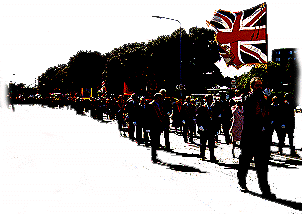
Aftermath
Undoubtedly the saddest and most controversial part of the whole affair.
The Stuart Kings had been unpopular monarchs even in Scotland from where they hailed, but they had found their main power base in the western clans of the highlands. At that time the Clans were little more than feudal tribes which kept the lower classes even more oppressed than their English and Scots counterparts. The Clan chieftains wielded power of life and death over their 'subjects'. In times of war, be it with the English or other clans they were able to order all the clan men to take up arms. Quite often these men were anything between 14 and 70 yrs old and were armed with anything from swords to sticks.
Cumberland was determined that this would be the last Jacobite rebellion by eliminating this power base. He also showed no mercy to the rebel prisoners.
The Royal army set about destroying the clan system during the 'Highland clearances' Deportations and murder were common. Gaelic, their language was banned as was the tartan and highlanders were banned from carrying arms on pain of death.
Modern Times
It seems strange that battles fought so long ago, for reasons that have been largely forgotten should have modern day significance, but they do.
Sadly the most obvious example of this is to be found in Northern Ireland where the history between protestant and catholic have been long and bloody. Every year tensions rise when the protestant marching season approaches. The 'Orange Lodges' dress in orange sashes and march to celebrate William of Orange's success in July 1690 over King James, Charles Stuart Grandfather. There are also many marches by Orange Lodges in Scotland.

An 'orange walk' today
It is somewhat perverse then that some to the same Scots who parade in celebration of King James' defeat in 1690 go misty eyed over the defeat of his Grandson the Bonnie prince 55yrs later.
Many people place the sole responsibility for the aftermath of Culloden on the English. This quite clearly was not the case. Although it would be hard to defend Cumberland's actions it is clear that many Scots participated willingly and brutally in the crushing of their countrymen the highlanders.
As I have already said more Scots stood with Cumberland than with Charles, but try explaining to any Scot that his ancestors are more likely to have fought on the 'English' side and see what reaction you get!
Most modern Scots identify themselves with the Highlanders, but back in the 17th and 18th century most lowland Scots had a similar view of the Highlanders to English, that they were a wild and backward race, the highlands were inhabited by tartan wearing (few lowlanders wore tartan) Gaelic speaking (again the lowland language was English) savages.
Unfortunately those were the terms in which people of that time expressed themselves.
The politicising of history, especially three hundred year old history is what I find offensive especially by many Scots who have a vested interest in downing the auld enemy. The fact is that British history is not well taught in our schools so most English people believe what they hear.
This has I hope redressed the balance a little.